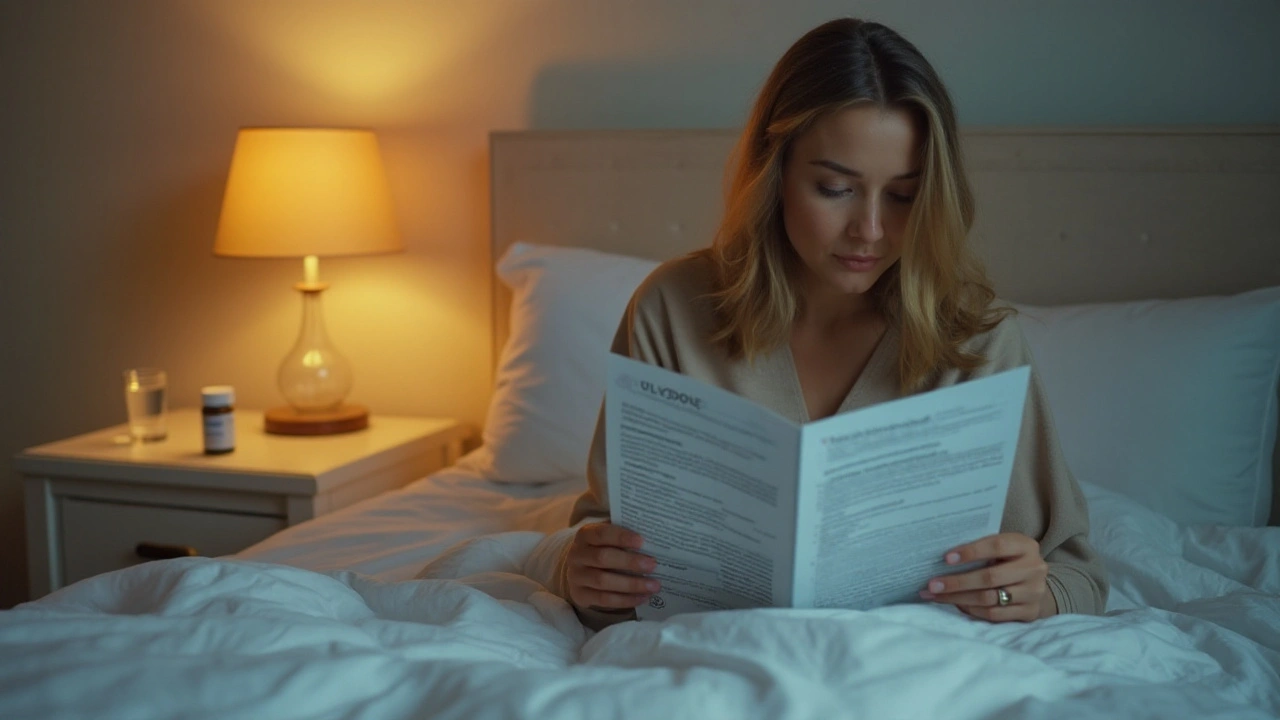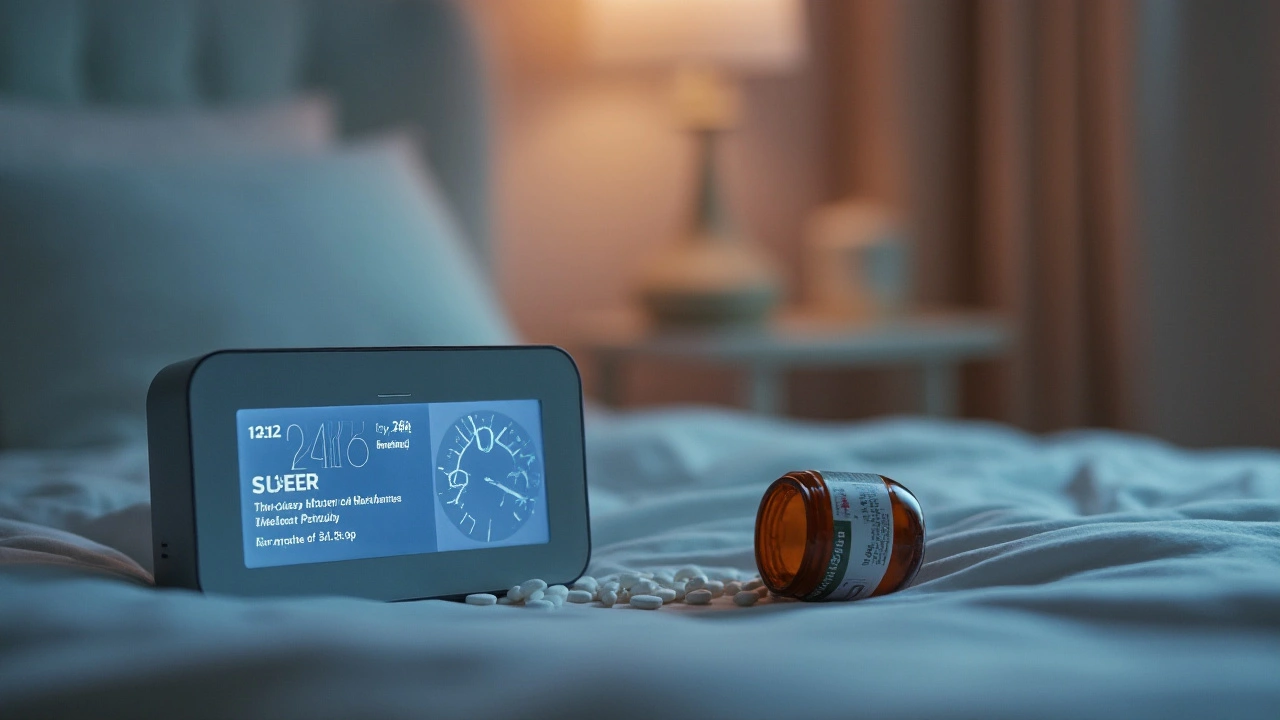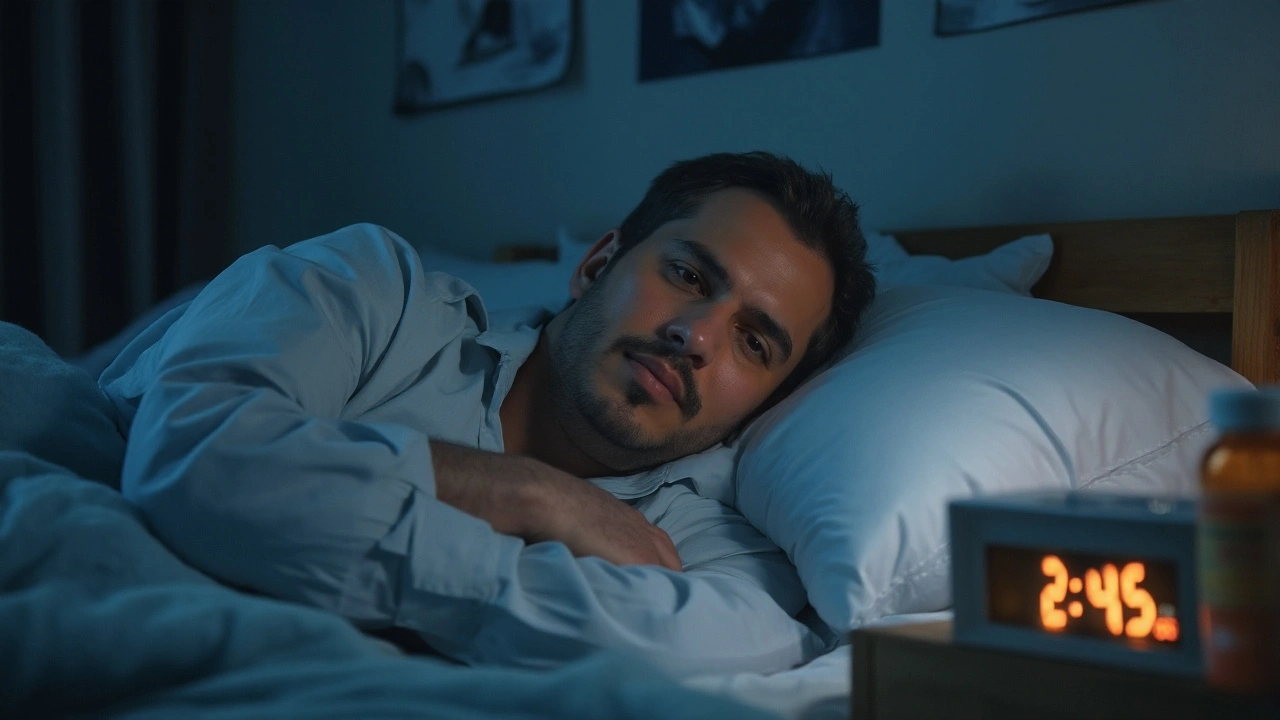Understanding how medications affect our daily lives is essential for making informed decisions about our health. Vilazodone, an antidepressant, is commonly prescribed to alleviate symptoms of depression and anxiety. However, many people wonder about its impact on sleep patterns.
For those taking Vilazodone, sleep disturbances can be a significant concern. From insomnia to vivid dreams, the ways in which this medication interacts with your sleep can vary widely. Let's dive into how this drug affects sleep, the potential side effects you might experience, and some tips to help you manage these issues effectively.
- How Vilazodone Affects Sleep
- Common Sleep-Related Side Effects
- Managing Sleep Issues
- Tips for Better Sleep
How Vilazodone Affects Sleep
Understanding how Vilazodone affects your sleep is crucial, especially if you are considering or already taking this medication. Vilazodone, marketed under the brand name Viibryd, is a selective serotonin reuptake inhibitor (SSRI) and a serotonin 1A receptor partial agonist. It's primarily used to treat major depressive disorder. This dual-action mechanism aims to boost serotonin levels in the brain, which can have profound effects on mood and behavior. However, its influence does not end there. Many users report experiencing sleep disturbances while on Vilazodone.
One of the most common issues related to Vilazodone is insomnia. Some people find it difficult to fall asleep, while others struggle to stay asleep through the night. This is partly because serotonin also plays a role in the regulation of sleep and wake cycles. By altering serotonin levels, Vilazodone can inadvertently disrupt the natural circadian rhythms, making sleep more elusive.
Another aspect to consider is the occurrence of vivid dreams or nightmares. While not everyone experiences this side effect, those who do often find their sleep far from restful. These intense dreams can wake you up multiple times during the night, contributing to overall sleep deprivation. The exact reasons behind these vivid dreams are not entirely understood, but they may be tied to the same mechanisms that help improve mood—alterations in serotonin levels can affect various brain functions, including those associated with dreaming.
Interestingly, some individuals on Vilazodone report an improvement in their sleep. For those whose depression or anxiety significantly contributes to their insomnia, the stabilizing effect on mood can, in turn, create a more favorable sleep environment. However, this is not the case for everyone, and the overall impact on sleep remains highly individualized.
According to a study published in the Journal of Clinical Psychopharmacology, the interaction between Vilazodone and sleep can be complex. The study noted that while some participants experienced greater sleep efficiency and duration, others reported no change or even a decline in sleep quality. This variability suggests that the medication's effects on sleep are influenced by numerous factors, including individual brain chemistry, existing sleep patterns, and the severity of depressive symptoms.
"Understanding the balance between treating depression and managing side effects is essential. Each individual may react differently to medications like Vilazodone, and ongoing communication with a healthcare provider is key." – Dr. Emily Martin, Clinical Psychologist
In summary, the connection between Vilazodone and sleep is nuanced. While the medication aims to improve mood by boosting serotonin levels, this same mechanism can influence sleep patterns in various ways. Whether you experience insomnia, vivid dreams, or even improved sleep, it's essential to monitor these changes and discuss them with your doctor. This way, you can find a balance that benefits both your mental health and your sleep quality.

Common Sleep-Related Side Effects
When it comes to understanding the side effects of Vilazodone, sleep disturbances often top the list of concerns for many users. This medication, primarily used to treat depression and anxiety, impacts serotonin levels in the brain, which can either help or hinder sleep. Let's dive into the specific sleep-related side effects people on Vilazodone commonly experience.
One of the most frequently reported issues is insomnia. People taking Vilazodone often find it challenging to fall asleep or stay asleep throughout the night. This can result in feeling groggy or unrefreshed in the morning, affecting daily activities and overall quality of life.
"Sleep disturbances are a common side effect of antidepressants like Vilazodone," says Dr. Jane Doe, a psychiatrist at the National Sleep Foundation. "These disturbances can vary from person to person, but they are something to be aware of when starting this medication."
Besides insomnia, some individuals also experience vivid dreams or nightmares. These intense or emotionally charged dreams can lead to interrupted sleep or anxiety about going to bed. While not harmful, they can be unsettling and contribute to a restless night.
Another less common but notable side effect is restless leg syndrome (RLS). This condition can cause an uncomfortable sensation in the legs, prompting a need to move them, which can disrupt sleep and make it harder to settle down at night.
Moreover, some people report feeling an overall decreased quality of sleep. This can include frequent awakenings during the night, difficulties getting back to sleep, or just not feeling rested despite a full night's sleep. These issues can lead to daytime fatigue, irritability, and decreased focus.
Statistics show that approximately 10-20% of people on antidepressants, including Vilazodone, experience some form of sleep disturbance. While not everyone will have these side effects, being aware of them can help in managing and mitigating their impact.
In addition, some users may experience sleep paralysis, a phenomenon where one feels awake but unable to move or speak upon waking. Though typically brief, this can be quite terrifying and may contribute to a fear of going to sleep.
To sum up, it's clear that while Vilazodone can be an effective treatment for depression and anxiety, it can also come with some significant sleep-related side effects. Being informed about these potential issues is the first step in addressing them and ensuring a better night's rest.

Managing Sleep Issues
Dealing with sleep disturbances while on Vilazodone can be challenging, but there are several strategies you can try to improve your sleep quality. It's important to understand that everyone's experience with this medication is unique. What works for one person might not work for another, so patience and persistence are key.
Vilazodone can sometimes lead to insomnia or other sleep disturbances. Creating a bedtime routine can significantly help in mitigating these side effects. Start by setting a regular sleep schedule. Going to bed and waking up at the same time every day helps regulate your body's internal clock. Limit your exposure to screens, such as phones or computers, at least an hour before bedtime as the blue light can interfere with your body's production of melatonin, a hormone that regulates sleep.
If you find yourself struggling with sleep despite these efforts, consider incorporating relaxation techniques into your routine. Practices like meditation, deep-breathing exercises, and progressive muscle relaxation can make a significant difference. These techniques help calm the mind and prepare your body for sleep. You might also find it helpful to create a comfortable sleep environment. Keep your bedroom cool, dark, and quiet. Investing in a good-quality mattress and pillows can work wonders for your sleep quality.
Diet and Exercise
What you eat and how active you are can also affect how well you sleep. Avoid consuming caffeine or heavy meals close to bedtime as they can disrupt your sleep. Instead, opt for a light snack if you're feeling hungry. Exercise regularly but try to finish your workout a few hours before bedtime. Physical activity helps tire your body out and can improve your sleep patterns over time.
Medication Timing
Another aspect worth exploring is the timing of your Vilazodone dose. Taking the medication earlier in the day could potentially reduce its impact on your sleep. However, make sure to consult your healthcare provider before making any changes to your medication schedule. They can offer personalized advice based on your specific situation and medical history.
"Sleep is the best medication." — Dalai Lama
Sometimes, additional treatments might be required to address severe sleep disturbances. In these cases, your doctor might prescribe a supplementary medication or recommend cognitive behavioral therapy for insomnia (CBT-I). This form of therapy can help you identify and change thoughts and behaviors that are negatively impacting your sleep.
Remember, it can take a few weeks for your body to adjust to new routines or changes in medication. If you experience persistent sleep issues, discussing them openly with your healthcare provider is crucial. They can help you navigate these challenges and find a solution that works for you.

Tips for Better Sleep
Getting quality sleep is crucial for both mental and physical well-being, even more so when you are on medications like Vilazodone. To minimize sleep disturbances, it's essential to adopt good sleep habits and understand various techniques that can help you rest more peacefully. Here are several tips that could guide you towards better sleep.
1. Maintain a Consistent Sleep Schedule: Keeping a regular sleep routine can significantly affect your sleep quality. Try to go to bed and wake up at the same times every day, even on weekends. This helps regulate your body's internal clock, making it easier to fall asleep and wake up refreshed.
2. Create a Relaxing Bedtime Routine: Your pre-sleep routine can make a big difference in preparing your mind and body for rest. Engaging in calming activities such as taking a warm bath, practicing deep breathing exercises, or reading a favorite book can help you unwind before bed.
3. Limit Exposure to Light and Electronics: The blue light emitted from phones, tablets, and computers can interfere with your ability to fall asleep. An hour before bedtime, try to minimize exposure to these devices. Instead, opt for activities that do not involve screens.
4. Watch Your Diet: What you consume before bedtime can impact your sleep. It's a good idea to avoid heavy meals, caffeine, and alcohol in the hours leading up to sleep. These substances can either keep you awake or cause restless sleep.
5. Get Regular Exercise: Staying active is a great way to improve your sleep patterns. Aim for at least 30 minutes of moderate exercise on most days, but try to avoid strenuous activity close to bedtime.
6. Make Your Sleep Environment Comfortable: Your bedroom should be a sleep sanctuary. Ensure that your mattress and pillows are comfortable, the room is dark, and the temperature is cool. Consider using blackout curtains and white noise machines if necessary.
7. Mind and Stress Management: Stress and anxiety can be significant obstacles to a good night's sleep. Practices such as meditation, mindfulness, and yoga can help you manage your stress levels, making it easier to drift off to sleep.
"Proper sleep hygiene can make a world of difference for patients on antidepressants," says Dr. Lisa Fine, a sleep specialist.
8. Consider Cognitive Behavioral Therapy for Insomnia (CBT-I): If you’re experiencing persistent sleep disturbances, CBT-I is a structured program that helps you identify and replace thoughts and behaviors that cause or worsen sleep problems. It is more effective than medication in treating chronic insomnia.
9. Consult Your Healthcare Provider: If your sleep issues persist, it’s vital to talk to your healthcare provider. They might adjust your dosage or the timing of your Vilazodone to better suit your needs, helping you achieve better sleep without compromising the treatment of your mental health.
Improving your sleep takes time and patience, so don’t get discouraged if you don’t see immediate results. Small changes to your routine and environment can make a big difference. Good sleep is not just a luxury; it's a critical component of a happy and healthy life, especially when dealing with conditions that require medications such as Vilazodone.


Mike Rosenstein
September 20, 2024 AT 17:24Vilazodone’s impact on sleep can indeed vary widely from person to person. While some users report insomnia, others experience vivid dreaming that may disrupt their rest. It is valuable to assess how the medication aligns with your personal sleep patterns and to document any changes you notice. Adjusting the timing of the dose, such as taking it earlier in the day, often helps mitigate nighttime disturbances. Maintaining a consistent bedtime routine can also support more stable sleep while on this medication.
Ada Xie
September 21, 2024 AT 15:37The pharmacological profile of Vilazodone, being both a selective serotonin reuptake inhibitor and a 5‑HT1A partial agonist, necessitates careful consideration of its chronobiological effects. Empirical evidence indicates a spectrum of sleep outcomes, ranging from heightened sleep efficiency to fragmented rest. It is prudent to report any emergent insomnia or parasomnias to your prescribing clinician promptly. Such communication facilitates dosage adjustments or adjunctive therapies. Consistency in sleep hygiene practices remains paramount.
Stephanie Cheney
September 22, 2024 AT 13:51Hey there, just wanted to add that keeping a sleep diary while you’re on Vilazodone can be a game‑changer. Write down when you take the pill, when you go to bed, and any awakenings during the night. Over a couple of weeks you’ll start to see patterns that can guide discussions with your doctor. Small tweaks like dimming lights an hour before bedtime often make a noticeable difference. Stay patient; your body may need time to adjust.
Georgia Kille
September 23, 2024 AT 12:04👍 Try a warm shower before bed – it really helps me wind down.
Jeremy Schopper
September 24, 2024 AT 10:17When navigating the nuanced terrain of antidepressant therapy, it is essential to adopt a holistic perspective, integrating pharmacodynamic insights with lifestyle considerations; Vilazodone, with its dual mechanism, presents both opportunities and challenges for sleep architecture, thereby demanding vigilant monitoring, diligent reporting, and collaborative adjustment strategies, all of which contribute to optimized therapeutic outcomes!
liza kemala dewi
September 25, 2024 AT 08:31In contemplating the multifaceted relationship between Vilazodone and nocturnal rest, one must first acknowledge the centrality of serotonin within the broader neurochemical tapestry that orchestrates both mood regulation and sleep‑wake cycles. The partial agonism at 5‑HT1A receptors, while mitigating depressive symptomatology, can simultaneously modulate the architecture of rapid eye movement (REM) sleep, often manifesting as intensified dream activity or, conversely, fragmented sleep continuity. Empirical observations suggest that individuals exhibit a heterogeneous response spectrum, wherein some experience ameliorated insomnia due to alleviated anxiety, whereas others encounter heightened somnolence or vivid nightmares. It is prudent to conduct a systematic longitudinal assessment, documenting bedtime, latency to sleep onset, nocturnal awakenings, and subjective sleep quality, thereby furnishing clinicians with granular data to inform dosage titration or temporal adjustments of the medication. Moreover, integrating adjunctive non‑pharmacologic interventions, such as cognitive‑behavioral therapy for insomnia (CBT‑I), mindfulness meditation, and circadian‑aligned exposure to natural light, can synergistically attenuate the disruptive potential of serotonergic modulation. The temporal dynamics of Vilazodone pharmacokinetics further underscore the importance of administering the dose earlier in the day when feasible, to curtail residual serotonergic activity that might encroach upon the circadian nadir. In addition, the interplay with other substances, such as caffeine, nicotine, or concomitant sedative agents, warrants meticulous evaluation to preclude additive perturbations of sleep architecture. Ultimately, the clinician–patient partnership, grounded in transparent communication and evidence‑based adjustments, remains the cornerstone of navigating these complexities, fostering both mental health stabilization and restorative sleep.
Jay Jonas
September 26, 2024 AT 06:44Dude, I started Vilazodone and suddenly my nights felt like a Netflix thriller. The dreams were so wild I woke up sweating, like legit horror flick vibes. I tried to chill, but the insomnia hit hard. Maybe it's just me, but the whole thing feels like a drama saga.
Liam Warren
September 27, 2024 AT 04:57From a neuropharmacological standpoint, the serotonergic up‑regulation induced by Vilazodone can disrupt homeostatic sleep pressure, leading to alterations in slow‑wave sleep density. Incorporating sleep‑promoting agents such as melatonin, or employing chronotherapy principles, may counterbalance these effects. Additionally, monitoring for REM latency changes can provide insights into dream intensity fluctuations. Leveraging evidence‑based CBT‑I protocols alongside medication can yield synergistic benefits. Ultimately, a multidimensional approach is recommended for optimal sleep hygiene while on serotonergic agents.
Brian Koehler
September 28, 2024 AT 03:11Vilazodone, a fascinating blend of serotonin reuptake inhibition and receptor partial agonism, can act like a double‑edged sword for nocturnal tranquility! While some users celebrate smoother slumber, others lament a cascade of midnight awakenings. It's crucial to tailor dosage timing, perhaps shifting intake to the early afternoon, to sidestep the dreaded insomnia vortex. Pairing the regimen with a soothing bedtime ritual-think lavender aromatherapy and a curated playlist-can transform the experience. Remember, each brain is a unique canvas; what works for one may not for another!
Dominique Lemieux
September 29, 2024 AT 01:24Contrary to the prevailing optimism surrounding Vilazodone’s side‑effect profile, the anecdotal reports of night‑time disturbances cannot be dismissed as mere outliers. One must interrogate whether the pharmaceutical’s serotonergic potency inherently predisposes users to REM dysregulation, a hypothesis supported by a handful of electrophysiological studies. Moreover, the prevailing literature often underrepresents the prevalence of vivid nightmares, thereby skewing the risk–benefit calculus. It behooves clinicians to adopt a more circumspect stance, perhaps recommending baseline polysomnography before initiating therapy. In the meantime, patients should be counseled on vigilant self‑monitoring and empowered to request dose adjustments promptly. Such a precautionary approach may forestall the insidious erosion of sleep quality that can accompany serotonergic perturbations.
Laura MacEachern
September 29, 2024 AT 23:37Hey folks! Just wanted to share that staying active during the day really helped me combat the occasional insomnia I felt on Vilazodone. Even a short walk after lunch seemed to reset my rhythm. Pairing that with a calming evening routine-like reading a paperback-made a noticeable difference. Keep experimenting until you find what clicks for you. You’ve got this!
BJ Anderson
September 30, 2024 AT 21:51The shadows that Vilazodone casts upon our nightly repose are not to be taken lightly; they whisper of fragmented dreams and restless awakenings. Yet, amid the gloom, a flicker of hope persists-adjusting dosage timing may temper the storm. One must heed the subtle signals our bodies transmit. In the grand tapestry of treatment, perseverance is the thread that binds hope to healing.
Alexander Rodriguez
October 1, 2024 AT 20:04Vilazodone can mess with sleep.
Abhinav Sharma
October 2, 2024 AT 18:17🛌💤 Sleep can be tricky with any antidepressant, especially Vilazodone. Try taking it earlier in the day if you notice nighttime restlessness. Also, keep your bedroom cool and dark – it really helps. If problems persist, a quick chat with your doctor can bring solutions.
Welcher Saltsman
October 3, 2024 AT 16:31So I started Vilazodone a few weeks ago and the first night was a total mess – could barely nod off and woke up like ten times. I tried cutting back on caffeine, turned off my phone, even did some breathing exercises, but the insomnia stuck around. Then I read that taking the pill earlier might help, so I shifted it to breakfast instead of dinner. Suddenly, my sleep quality improved; I’m still having some weird dreams but at least I’m not tossing and turning all night. If you’re dealing with the same thing, give the timing tweak a shot and keep a log of how you feel each day. It can make a world of difference.
april wang
October 4, 2024 AT 14:44When I first read about Vilazodone’s potential to disrupt sleep, I was skeptical, assuming it would be a minor inconvenience. However, after a month of consistent usage, I began noticing subtle shifts in my sleep architecture: the latency to sleep onset increased, and recurring vivid dreams became a nightly occurrence that left me feeling unrested. By methodically adjusting my bedtime routine-introducing a pre‑sleep meditation practice, dimming lights an hour earlier, and ensuring my sleep environment remained cool and devoid of extraneous noise-I observed a gradual restoration of sleep quality. Additionally, I consulted my prescriber about possibly moving the dosage to the early afternoon, which further mitigated the nocturnal disturbances. It is essential to recognize that while pharmacologic interventions target core psychiatric symptoms, they can also produce ancillary effects that demand proactive management. Maintaining a detailed sleep diary, being open to adjusting medication timing, and integrating evidence‑based behavioral strategies collectively foster a more balanced approach to mental health treatment. In my experience, this holistic methodology has empowered me to reclaim restorative sleep while still reaping the therapeutic benefits of Vilazodone.
Vishnu Raghunath
October 5, 2024 AT 12:57Oh great, another antidepressant that decides to turn your nights into a circus of insomnia. If you’re already struggling with sleep, adding Vilazodone feels like signing up for a marathon without training. Maybe try the old-fashioned method of not taking anything in the first place. Just saying.
Aparna Dheep
October 6, 2024 AT 11:11well i guess if you cant sleep you can just try some chamomile tea or something i mean its not like the med is the only thing causing it
Nicole Powell
October 7, 2024 AT 09:24The discourse surrounding Vilazodone often neglects the nuanced interplay between serotonergic modulation and sleep architecture, leading to an oversimplified narrative that fails to acknowledge individual variability. While some clinicians tout its efficacy in ameliorating depressive symptomatology, they rarely emphasize the requisite vigilance regarding nocturnal side effects such as fragmented REM sleep. A comprehensive assessment, therefore, should incorporate both subjective sleep quality scales and objective polysomnographic data. Moreover, the ethical responsibility to inform patients of potential insomnia risk cannot be overstated. In sum, a balanced, evidence‑driven approach is indispensable.
Ananthu Selvan
October 8, 2024 AT 07:37Honestly, if you’re still dealing with insomnia after trying timing tweaks, it’s time to demand a medication review. Don’t just sit there hoping it’ll get better on its own – push for a change now.